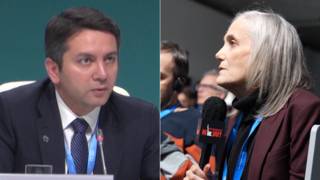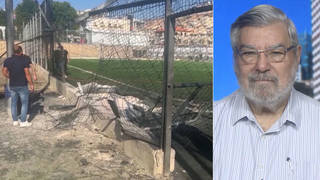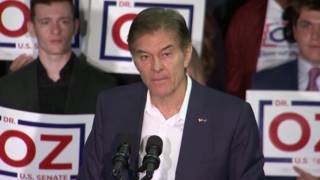
Related
Topics
Guests
- Rashid KhalidiEdward Said professor of Arab studies at Columbia University. He’s the author of several books. His most recent is titled Brokers of Deceit: How the U.S. Has Undermined Peace in the Middle East.
Columbia professor Rashid Khalidi discusses how the war in Syria has become a proxy war with a number of nations involved, including Russia, Iran, the United States, Israel, Turkey and the Gulf states.
Transcript
NERMEEN SHAIKH: Rashid, let’s bring you in. First, do you agree with what Moazzam said about what needs to happen? First, your response to the U.S., British and French strikes, and then what you think needs to happen?
RASHID KHALIDI: Well, I think the important thing that needs to happen is that this is a civil war and a proxy war, and the most—exactly as Moazzam Begg said, the most lethal part of it is the proxy war by these air forces, whether we’re talking about the United States, Turkey, Emirates, Saudi Arabia and so forth on one side, or whether we’re talking about Russia and Iran on the other side. The only way to deal with this is to both address the political issues and get a proper regime in Syria in the place of the Assad regime, and, most importantly, to end this external intervention.
And that’s going to require a completely different approach, not just by the United States, by a large number of countries, the Gulf countries and Turkey and other countries that are up to their ears in intervention in Syria. I mean, the Syrian war was not just a civil war. It was like the Lebanese war. It’s like what’s going on in Yemen and Libya. It’s also a proxy war, where major powers—Saudi Arabia or the Emirates, the United States, Britain, France, Russia, Iran—are up to their ears in intervention.
And as Moazzam Begg said, correctly, the most lethal part of that intervention is by air forces. So, it’s not—in my view, it’s not just a matter of a no-fly zone. It’s a matter of figuring out a way to de-escalate this conflict, get these external powers out and have a proper political process whereby this atrocious regime can be replaced. I mean, one of the other problems is, it’s not just the millions of people who are refugees and who are terrified of going back because they’re afraid of the regime. There are millions of people on the other side who are terrified of the opposition. So a political process is not going to be an easy business, but that’s what—that’s where we should be focusing.
AMY GOODMAN: And your response to the debate over the Authorization for Use of Military Force, the AUMF, that’s going to be taking place in the Senate in the next few days?
RASHID KHALIDI: I mean, any obstruction to the untrammeled power of an imperial executive in this country is, in my view, a good thing. I think that the debate might lead to approval of the use of force. I think the president should be restricted as much as possible. The United States is fighting wars all over the world, in countries where I cannot see any possible interest for the United States or for world peace, and, as Moazzam Begg has said, killing people, because that’s what happens in aerial bombardment. I was in Beirut in 1982. You bomb buildings, you kill people, whatever your target is, whatever your objective is.
NERMEEN SHAIKH: Well, I want to ask about what U.S. interests in Syria are. There’s an article that was published earlier this week in The Boston Globe by Stephen Kinzer, who writes, quote, “The specter of a peaceful and prosperous Syria under Assad’s leadership terrifies them.” That is, American military and security advisers. “They believe that until [Assad] is gone, it is in America’s interest to keep Syria divided, unstable and impoverished. … According to the logic behind American strategy in the Middle East—and the rest of the world—one of our principal goals should be to prevent peace or prosperity from breaking out in countries whose governments are unfriendly to us.” So, from what we know, Rashid, do you think that that is a determinant of U.S. policy in Syria? And if so, is it likely to change? What interest does the U.S. have in Syria?
RASHID KHALIDI: I hate to say this, but I really think American policy in Syria has been totally incoherent. It’s had some of the effects that Stephen Kinzer talks about, but I don’t think that was a result of serious planning. I think that it’s been, frankly, one of the most disgraceful episodes in American history, the way the United States has treated Syria.
But that’s actually true of Yemen. It’s actually true of Libya. The United States has not acted in any way responsibly. These are conflicts that really should be brought to an end, and which the United States is feeding. In the case of Syria, obviously it’s participating. In the case of Yemen, the United States is arming the Saudis and their allies, who are causing the greatest humanitarian disaster outside of Syria in the region.
So, I mean, I would say that the effect is actually as Stephen has said. We have four completely dysfunctional—three-and-a-half completely dysfunctional countries in this region, largely as a result of external intervention: Libya, Yemen, Syria and, to a certain extent, Iraq. All of these are places where the United States and its allies and other foreign powers have meddled, and they have created an absolutely unholy mess.












Media Options